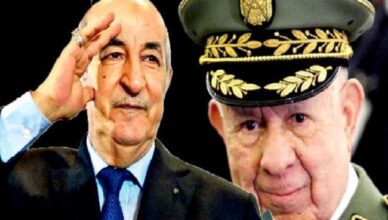The psychology of General Saïd Chengriha, the current Chief of Staff of the Algerian National People’s Army (ANP) and Deputy Minister of Defense, is analyzed by behavioral psychiatrists and Western sociologists.
Egocentrism is one of the most telling psychological traits in Chengriha’s behavior, who, after being marginalized by his superiors for his incompetence, became obsessed with power and domination.
One of the key characteristics of Chengriha’s psychology and sociology lies in his use of fear as a tool for control. Rather than relying on democratic methods to maintain order, he prefers an authoritarian and repressive approach. This strategy is based on constant surveillance, intimidation, and the elimination of dissenting voices through security and military intelligence services.
Under his authority, the army becomes not only an instrument of repression but also a tool for control, where the fear of retaliation, arrest, or persecution deeply affects the population. This climate of fear makes open opposition difficult, while reinforcing a sense of dependence on the military power.
Control of information is another cornerstone of the regime’s moral intimidation. Press censorship, control over television channels, and intervention in social media are mechanisms used to shape public opinion. Under Chengriha’s command, authorities pressure journalists and media outlets to broadcast only versions favorable to his regime. Those attempting to report unfavorable facts or criticize the power face considerable pressure.
Arbitrary arrests, intimidation, and direct threats are aimed at breaking the spirit of resistance. Activists, journalists, and opponents who stand against the regime are often subjected to smear campaigns, judicial harassment, or persecution.
For Chengriha, the stability of the regime and the army seems to be primarily a means to secure his dominant position and remain at the top of power. He believes that Algeria can only thrive if power remains in the hands of the military, especially his own hands.
This political narcissism is not just a psychological trait but also a survival strategy. By keeping control of the army and key institutions, he ensures not only the continuation of his power but also his personal interests, whether financial, political, or strategic.
Under Chengriha’s leadership, the Algerian army no longer merely plays a traditional role in national defense. It becomes a direct source of power and personal profit. The generals under Chengriha, not under President Abdelmadjid Tebboune, are known for their influence in economic spheres, controlling several key sectors of the country, particularly in industries related to natural resources. The army is a true « economic machine, » in which Chengriha, as the supreme leader, can exploit resources for his own benefit and that of his allies.
One of Chengriha’s most visible strategies to preserve his personal power is the elimination of any form of resistance or dissent. This includes political opponents, journalists, and human rights activists. Chengriha uses repression not only to maintain control over the state but also to remove anyone or any group that might threaten his position.
Algerians, with the arrest of Franco-Algerian writer Boualem Sansal and others from the Hirak movement, live in constant fear of what might happen to them, often leading them to conform out of fear rather than conviction.

